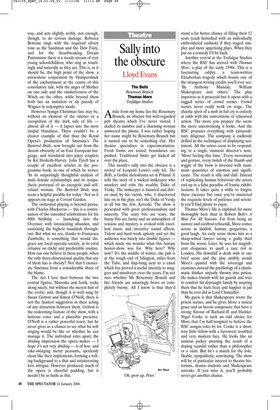Theatre
Sally into the obscure
Lloyd Evans
The Bells Rosemary Branch Thomas More Trafalgar Studios Amile from my home lies the Rosemary Branch, an obscure but well-regarded pub theatre which I’ve never visited. I dialled its number and a charming woman answered the phone. I was rather hoping her name might be Rosemary Branch but it turned out to be something else. Her theatre specialises in experimentation. Fresh forms are tested, boundaries are pushed. Traditional limits get kicked all over the place.
This month’s sally into the obscure is a revival of Leopold Lewis’s only hit, The Bells, a Gothic melodrama set in Poland. It tells the story of a wicked innkeeper who murders and robs the wealthy Duke of Vesky. The innkeeper is haunted and driven mad by his victim, who, I discovered late on in the play, isn’t the Duke of Vesky at all but the Jew, Koveski. The show is presented with great professionalism and sincerity. The scary bits are scary, the funny bits are funny and an atmosphere of tension and mystery is evoked with excellent music and inventive sound effects. Talent and hard work aplenty and yet the audience was barely into double figures which made me wonder what this fantasy horror-show was for. Why here? Why now? It’s the middle of winter, the pub is at the rough end of Islington, miles from the Tube, and slap-bang next to a canal which has proved a useful amenity to muggers and murderers over the years. I’m not sure whether Ms Rosemary Branch and her friends are amazingly brave or completely barmy. All I know is that they’d stand a far better chance of filling their 52 seats (each furnished with an individually embroidered cushion) if they staged simpler and more appetising plays. When they put on a comedy I’ll be back.
Another revival at the Trafalgar Studios where the RSC has arrived with Thomas More, a play of the early 1590s. This is a fascinating oddity, a team-written Elizabethan tragedy which boasts one of the strangest writing credits you’ll ever see: ‘By Anthony Munday, William Shakespeare and others.’ The play improves as it proceeds but it opens with a ragged series of crowd scenes. Crowd scenes never really work on stage. The chaotic spirit of a mob in full cry is entirely at odds with the conventions of rehearsed action. The more you prepare the scene the more unconvincing it looks. And the RSC prepares everything with extraordinary diligence. The company is endlessly drilled in the techniques of displaying sentiment. All the actors seem to be responding to a single, insistent director’s note, ‘More feeling this time.’ Every movement and gesture, every twitch of the thumb and wiggle of the brow is invested with maximum quantities of emotion and significance. The result is silly and dull. Instead of replicating human behaviour the actors end up in a false paradise of frantic exhibitionism. It takes quite a while to forgive these excesses but once you’ve mustered the requisite levels of patience and serenity you’ll find plenty to enjoy.
Thomas More’s life is explored far more thoroughly here than in Robert Bolt’s A Man For All Seasons. Far from being an austere and cerebral refusenik, More comes across as laddish, human, gregarious, a good laugh. An early scene shows him as a sharp-witted lawyer saving a guilty thief from the noose. Later, he uses his magnificent eloquence to quell a race riot in London. His downfall is dealt with in one brief scene and the play nimbly avoids More’s quarrel with the sovereign and examines instead the psychology of a charismatic thinker unjustly thrown into prison. He makes friends with his guards and tries to comfort his distraught family by assuring them that he feels freer and happier in jail than he ever did as Lord Chancellor.
My guess is that Shakespeare wrote the prison scenes, and he gives More a stoical grace and an heroic composure that have a strong flavour of Richard II and Hamlet. Nigel Cooke is such an odd choice for More that I’m half-tempted to believe the RSC assigns roles by lot. Cooke is a short, wiry little fellow with a furrowed, troubled and very modern face. He looks like an anxious jockey awaiting the result of a doping scandal rather than a philosopher or a saint. But he’s a match for the role, likable, sympathetic, convincing. The show will be of particular interest to theatre historians, drama students and Shakespeare anoraks. If you miss it, you’ll probably never get another chance.














































 Previous page
Previous page